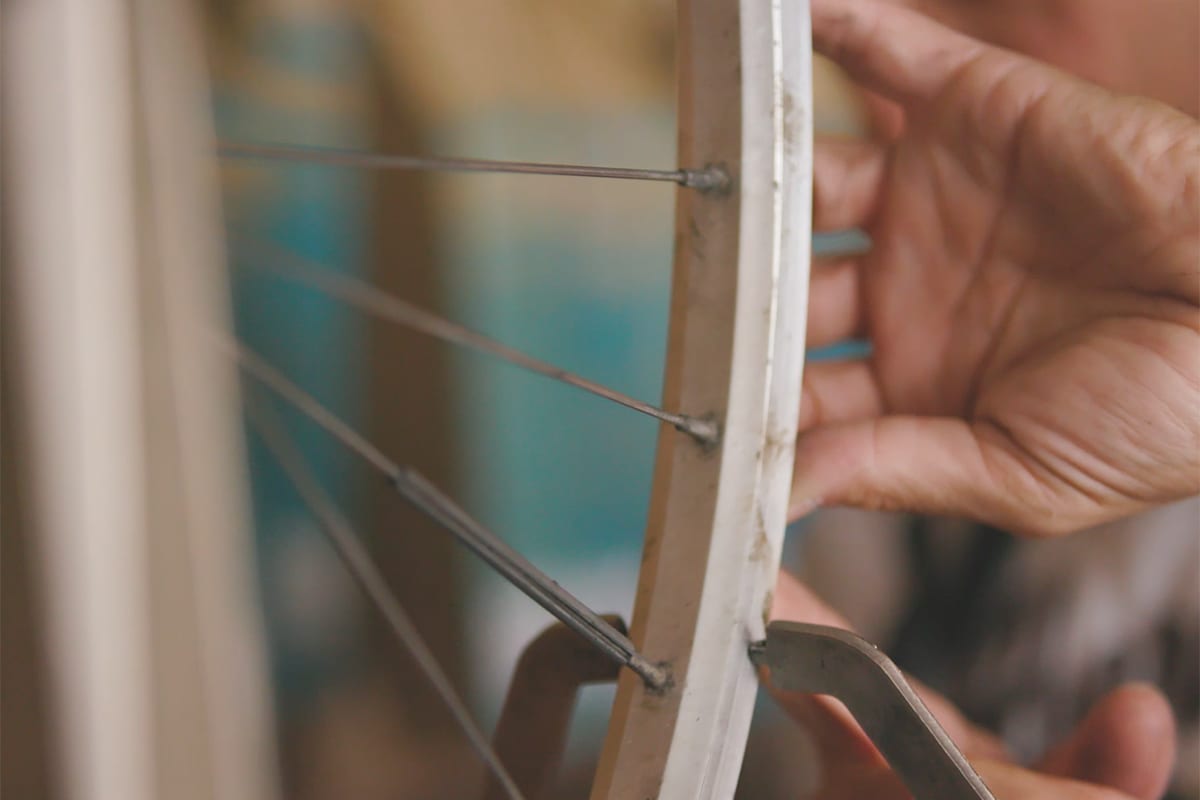The nod
Do you know The Nod? You know The Nod. Let me give you a quick example of The Nod in practice.
My Dad has just bought himself a riverboat, and a few weeks ago took me on my first trip down The Thames. As I sat on the front soaking up the sunshine, I noticed the same thing happening every time another boat passed – the driver would lock eyes and then give The Nod; a subtle, respectful, bow of the head.
The Nod says you are part of a secret club, without a membership card or a t-shirt, but one whose members have a mutual respect for each other.
The Nod is equally applicable to runners, to cyclists and anyone else who feels an affinity with someone else. It’s an acknowledgement of each other’s membership of a unique tribe – and a shared familiarity with all the highs and lows that come with it.
Every small business owner, too, gives each other the metaphorical Nod. They all understand the ups, the downs, the struggles, the investment and the personal sacrifice that goes into doing what they do. It’s created a mutual, albeit sometimes grudging, respect by small business owners for each other.
But here’s the kicker – there’s some bad news for the majority of big businesses and B2B marketers who spend their days trying to sell to small business – you, sadly, have not earned The Nod.
While you’ve been bombarding small business owners with emails, banner ads and your 54th ‘exclusive’ PDF about how life changing your product is (in exchange for their personal details, of course), you’ve missed out on understanding your audience. You’ve failed to dig deeper into how their life and business are intertwined and therefore what they respond to. Most importantly, you’ve neglected to prove to them why you deserve The Nod and why every small business owner should talk to you, listen to you and ultimately buy from you. But this can change. If you just look a little deeper and take time to understand your audience, you’re on the right path to earning The Nod.
Rethinking a stereotype
Here’s the problem: most of the time, marketers don’t look deep enough and we’re far too happy believing in stereotypes.
Google ‘small business owner’ and you’ll see what I mean – a flurry of images of coffee and flower shop owning, tech savvy millennials. And while for some small business owners this may be the case, in reality they are much more diverse and interesting than this – each with their own individual story to tell.
We wanted to find out more. So we embarked on The Trip, a two-week tour around the UK to meet a variety of small business owners.
The aim was to help me, my esteemed colleagues at Earnest and marketers everywhere understand what really makes small businesses tick. Ultimately, we wanted to share what we learned to help those selling everything from raw materials to cloud software solutions, get under the skin of this much-misrepresented audience and gain a real sense of who they are talking to.
Travelling across the country we met cider farmers, shoe designers, butchers, eBay millionaires, arcade and museum owners, small charities, not-for-profit energy companies and everyone in-between. We wanted to get a snap shot of UK small business and gain some insight into what really matters to the people for whom work and life is so closely intertwined.
Here’s what we learned, and what it means for any marketer who wants to succeed in successfully capturing the hearts, minds and a bit of budget from small business owners around this fair isle.
Do you know what amazes me? Every single person writes a business plan either to take to the bank to get their loan or because they have been told to by their business school. Then the second they get started, it’s thrown in the bin! My advice? Stick to your foundations and you can’t go far wrong.
1. Foundations
Why does anyone start a business? What is it that ignites their desire to take that path, chance it all and go it alone?
Most people call it The Itch – a feeling that exists within every single small business owner that needs to be scratched. The Itch is that unrelenting desire to break free, to do something on your own, to be your own boss and make the leap into the world of running your very own business.
But people scratch The Itch for different reasons – some want to make a whole chunk of cash and retire to the shores of Saint Tropez, some want to feel like they have made their mark on the world, some want to shake up a broken industry and some just want to do something interesting every day
.
Whatever the reason, each business has its own foundations that it’s built on – the thing that, when it all gets wobbly and they lose direction, they can always come back to.
The foundations of a business are fundamental to who they are and what makes them tick.
Marketers talk a lot about the importance of segmentation and how best to group the various businesses they are targeting – whether it’s size, or revenue or industry. But there is one segmentation strategy that’s been overlooked and that’s the different foundations that businesses are built and grown on – the very reason they exist.
If brands can find out and understand the reason their small business prospect was set up, then they have a much better chance of connecting and, ultimately, selling to them.
This section tells the stories of small businesses who are built on very different foundations – and what that means for both the people who are running them and the people who want to market to them.

i. A business built on profit
Many businesses have one aim: to grow quickly and make money.
It’s the principle foundation for lots of businesses and something the many marketing messages focus around. Just think how many B2B communications you see that can be boiled down to We’ll save you time and money
.
The foundation of pure profiteering is an interesting one – both because it’s such a common narrative in the world of the start up (the concept of 10X growth and the desire to become a ‘unicorn’ business is mentioned in nearly every Silicon Valley blogpost/podcast) and, conversely, because it’s an element very few small businesses we met said was their biggest driving force. However, there were some.
To find out more about a small business that is built on the foundations of making money, we headed up to the North East and interviewed Tony Snaith, owner and CEO of Communicate PLC. For him, growth and profit gains were key reasons for setting up his business.
Communicate PLC was created to provide networking solutions to businesses across business parks – enabling new and small businesses to move in without the worry of having to set up their IT infrastructure.
Tony told us that when you have a very specific goal, which in his case was to float the business within 10 years, you need two key things as part of your foundation: rigour and effective structures that all fit with the business’s ultimate goal.
For him, this meant setting up as a Public Limited Company from the very beginning (and even including the PLC element within their name). It also meant he worked hard and invested heavily right at the start to have the right legal structures, the right accounting practices and the right businesses process in place from day one – something many business do much later down the line (or never in some cases).
Rigour means my business can quickly expand and roll out in new regions, as well as adapting to new market trends and technology innovations while keeping to a clear direction.
Tony preached the importance of having a strong mission and vision from the start that you can always come back to, and it’s worked: his flawless business plan that he has stuck to from day one, has now earned him the status as one of the fastest growing small businesses and most innovative companies in Europe.
It’s clear that a business whose mission is to grow fast and sell must keep its eyes on the prize and, at the least, should have a very specific roadmap of how to get there.
The question for marketers looking to sell to and support people like Tony should be where they can best fit in along that journey and how they can make that road to success both smoother and shorter.
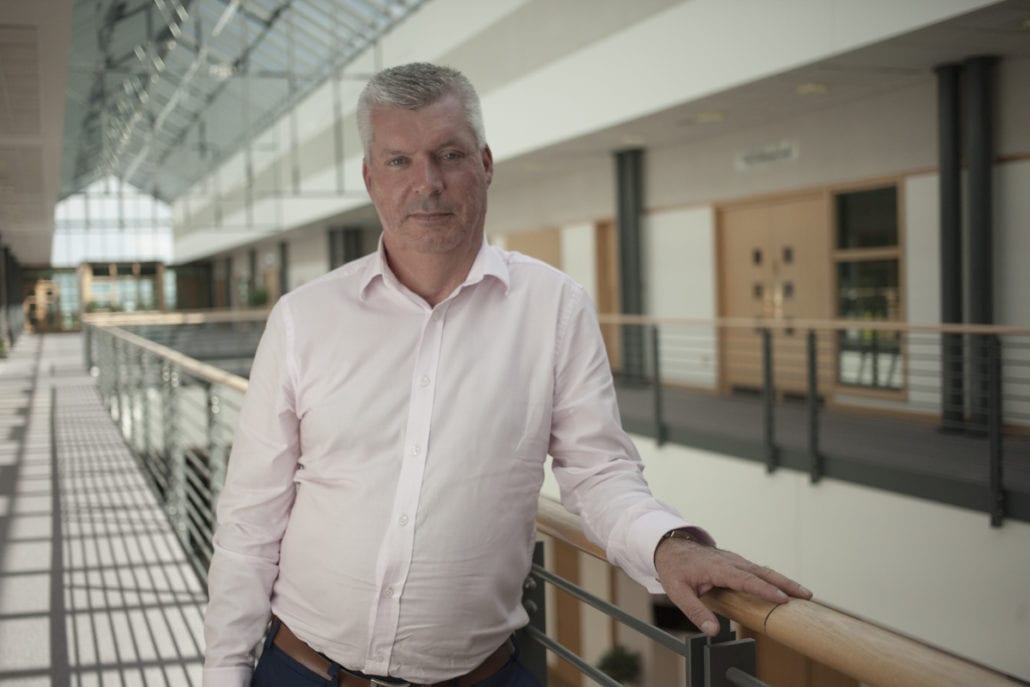
Rigour means my business can quickly expand and roll out in new regions as well as adapting to new market trends and technology innovations while keeping to a clear direction.
TONY SNAITH, OWNER AND CEO OF COMMUNICATE PLC
ii. A business building a legacy
Obviously every business has a P+L sheet they keep their eyes on, but it soon became clear to us that when it comes to reasons for running a business, it’s not all about the money for everyone. In fact, many have goals that the owners themselves may never be around to see the results of.
Down in Somerset we sat in the middle of an orchard full of apples with Harry Fry and, over a pint of cider, asked him about his dreams for the future. If I won the lottery, I’d go and buy a farm,
he grinned.
Harry and his son Toby are slowly growing Harry’s Cider, a cider production and retail business run from their farm in Somerset.
Harry told us that his whole life has been in farming, starting as a dairy farmer milking cows in 1982. But after farming regulations made things tougher and Magners released its multi-million pound campaign that made drinking cider trendy, it became clear he needed to ‘pivot’ – cider was on the up and Harry wanted a bite of the apple.
He said that while his businesses is still producing just a tiny speck of the total amount of cider made in the UK, he wants to slowly build a business with a solid brand that can last a number of generations.
I do feel like I should pass the business onto the next generation. It’s the only way you can build an empire – by passing it on. If I decided to just build this business and sell it in five to ten years time and retire on just what I made, then what future is there for my children? I’m just like any other farmer and it will pass from one generation to the next.
But the idea of building a business that has been passed through the generations isn’t just good for the kids – Harry believes it’s a fundamental part of what makes a good brand and a good business.
People relate to me, my dad and the local area that we represent. People buy it and will keep buying it because of the story behind us, because of our heritage and because we’re local – local is such a big theme nowadays.
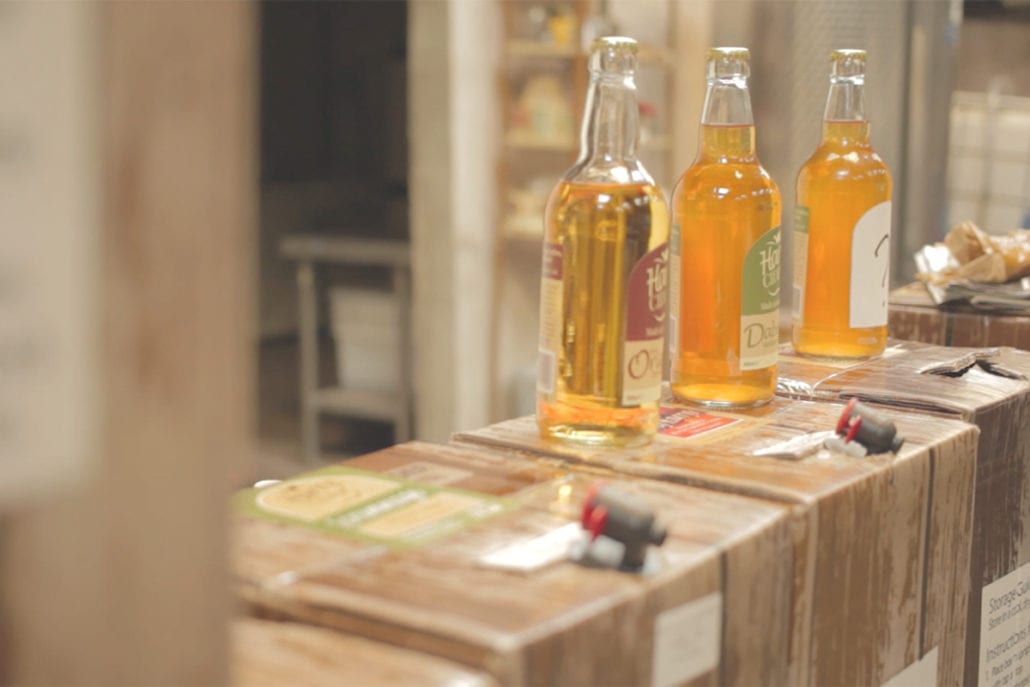
This means things are different for Harry when it comes to running a business. Things move much more slowly. Considerations and decisions about what he buys and who he partners with are centered around thinking about the long term, not the short (something that is often a huge differentiation between big business and small business). It’s not about a quick buck, but about trusted partnerships. Take note.
iii. A business built on personality
Whether someone has set up their business with a shorter-term plan to grow and sell, or a longer-term plan to build an empire, there is one thing that connects them all – the blurred lines between their work and personal life.
Often a small business owner’s personality and personal story are itself the foundations of the business, and the very essence of what the company is all about.
Up in Middlesbrough we met Andrew Burton, an incredibly likeable guy who has built his business on his own, very personal story. After signing as a professional footballer, Andy was released from his contract at Middlesbrough FC, which led to an incredibly low time in his life and a battle with mental health that was sadly coupled with further health difficulties.
But Andy used this experience to his advantage when it came to setting up a business unique to him and this in itself has become his unique selling point.
Andy’s realisation was around the importance of learning about the mental and psychological side of exercise, as well as the physical side. It was this personal insight that gave the inspiration for the foundation of his business.
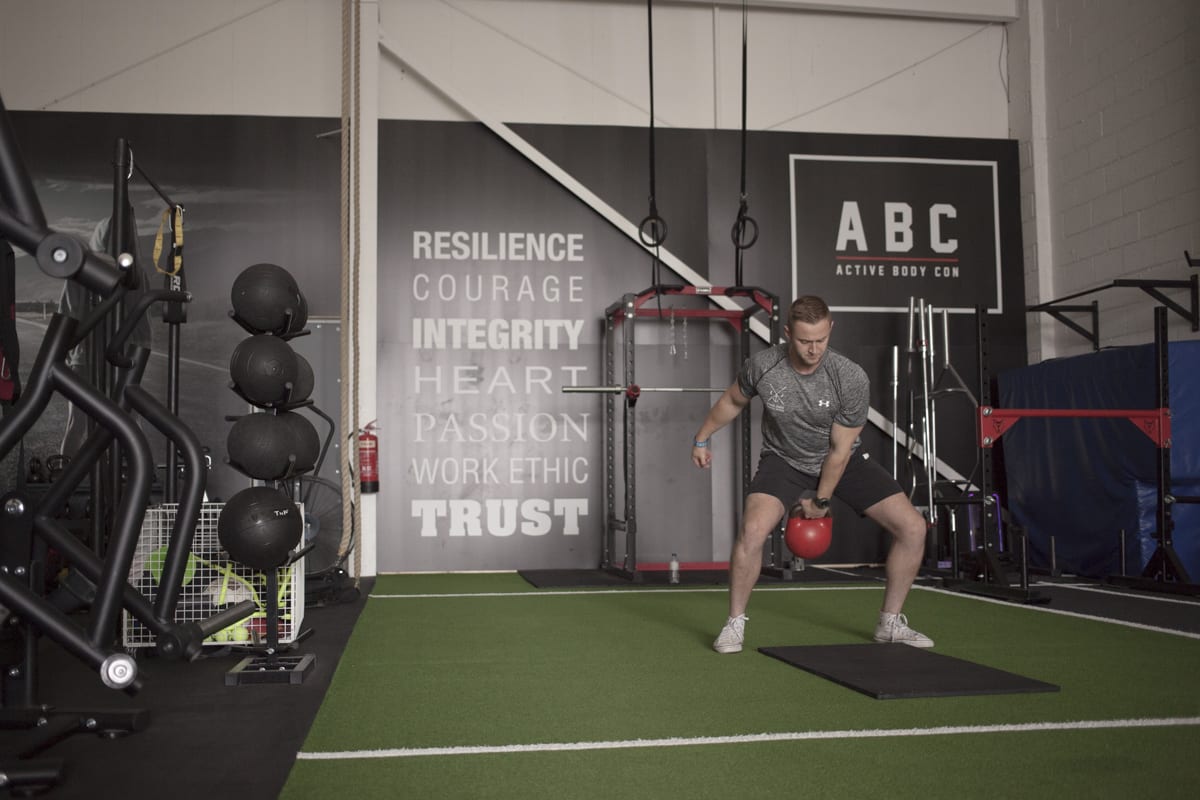
Looking back at my life, it was fitness that helped me through personal struggles. Everything in here is from my own personal experiences, which makes my business completely original and unique.
When it comes to passion for what he is trying to achieve, Andy has it in spades. He genuinely wants to help his clients change their lives and has dedicated his life (working 5.30am – 10pm all day, everyday) to help them do it.
Andy doesn’t want to be a millionaire, he doesn’t want to start the next Virgin Active, he just wants to help people learn and not experience what he did – and you see this in every single part of his business.
Our gym is not your standard commercial gym – we are looking to actually do what we say in changing lives both from a lifestyle and mental health point of view. We are all about giving people direction. The aim really is to change lives.
But having such close links between your personal life and your business can bring its own challenges.
Of course stuff goes wrong, but I lie awake at night knowing I am not only the person that cares the most about it, but I am the only person really responsible for fixing it.
Each day you’ve got a purpose, you know why you are there, and you stick to that and once I can see the real change in people, looking back, that’s when I know I am a success.
Marketers need to understand this passion and this raw ambition to build and create something that is unique to the person – it’s the biggest example of where generic, rational and corporate messages just won’t be given the time of day.
iv. A business built on external elements
While the foundations of most small businesses are led by the founder’s hopes, dreams and aspirations, sometimes they’re shaped by factors outside the owner’s control.
During The Trip, we were lucky enough to meet two small business owners who were knee-deep in setting up their operation.
When we met Lara and Mike in Bristol, they each had a paint brush in hand, adding the final touches to Delah, their café-cum-bar-cum-restaurant that was set to open the following month. They were open and honest about how their foundations have been both knocked and shaped by elements out of their control.
It’s amazing the number of outside factors that influence and shape your business before you even get going – especially if you are launching a physical space. The competition on your street, the type of customers in the area, the names that fit your business and brand perfectly (but are also available online), the suppliers you want to use to get the best products locally – they all affect the final product.
It’s a stressful time in the lead up to launch and there are many balls to juggle – if brands can support start-ups in helping guide them through the obstacles and forks in the road that they come up against, they will become much more ‘sticky’ as the business continues to grow.
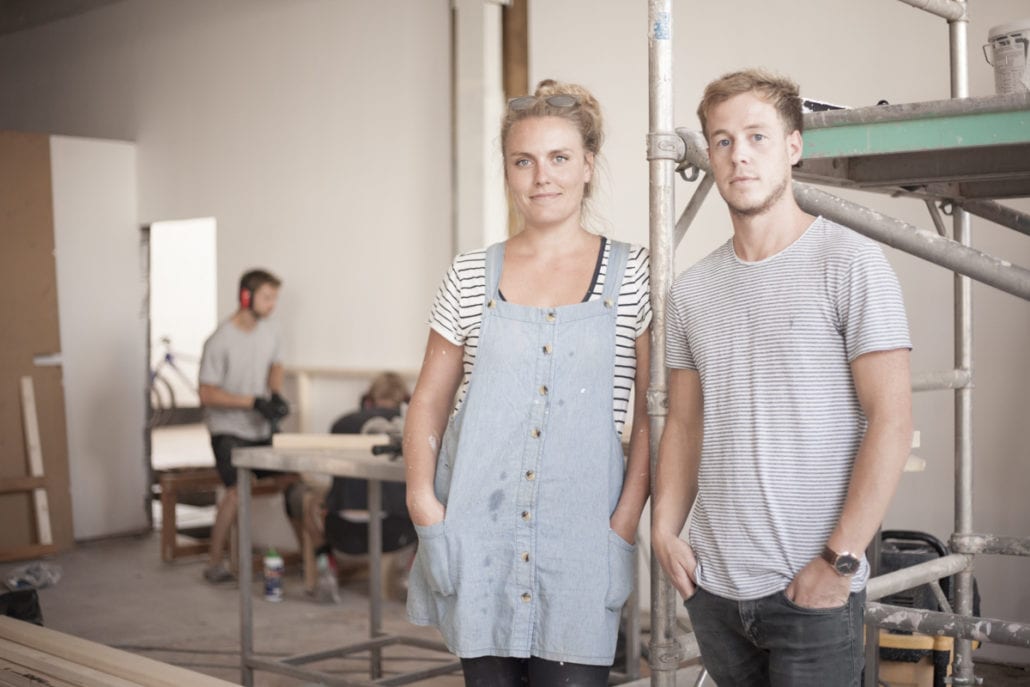
It’s amazing the number of factors that influence and shape your business before you even get going
v. A business built on a bigger mission
Foundations of a business can go beyond the organisation itself. The ambitions and reasons for scratching the itch may be based on a bigger ambition to change an industry or society’s attitudes and actions as a whole. In short, the foundations for some businesses have a whole bigger meaning.
This is certainly the case for Matt who runs Temple Cycles in Bristol.
When we asked about his vision of the future, he told us that, yes, he not only wanted to grow the size and reach of his own business, but he had a bigger ambition. He wants to grow the number of people cycling in and around Bristol, educating people more about bikes – how they are made, what makes good quality and even how owning one can change your life.
I see myself as much more than just building a bike shop, I want to build an industry and I want to change the way people see cycling in general
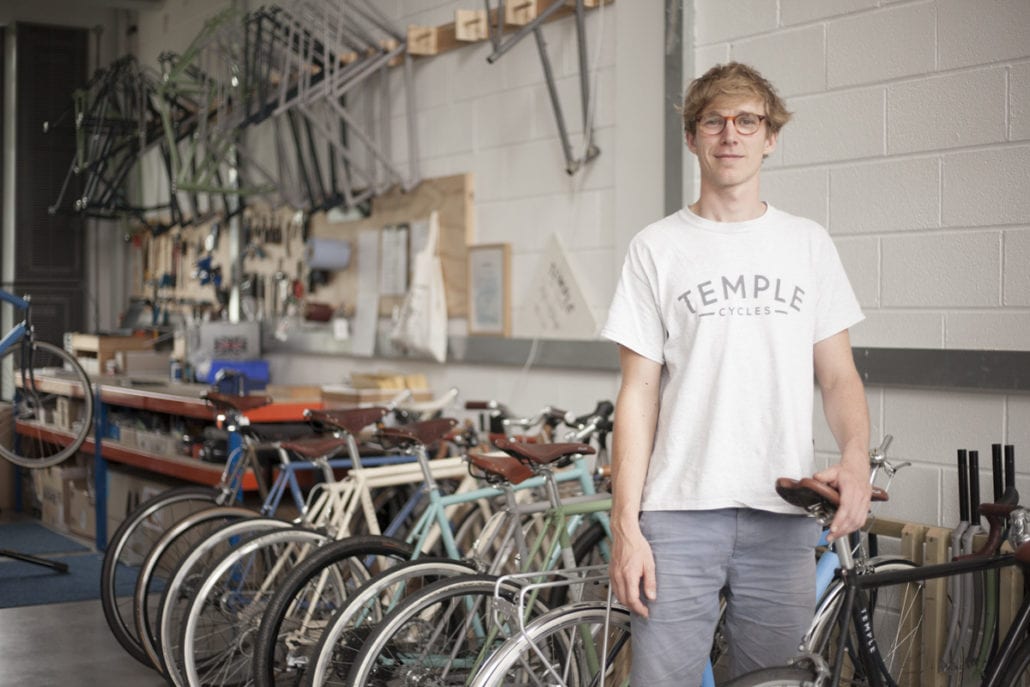
In Britain, people’s perspective of bikes is not how it should be. I want to create a shift in opinion and society’s attitudes towards my product. I want to help grow the bicycle industry.
Matt wants to do this by building a completely different business model to his competition. Take, for example, his idea of wanting to create products for life – something he thinks has been lost in our more disposable, commercial world.
Where bike manufacturers largely bring out new models every year, slashing the prices of the previous season’s bikes, and build bikes that (potentially) are not made to last, Temple Cycles want their customers to buy once and the bike to last them for life – with owners passing on their bikes through the generations.
I wanted to design bikes that blended what I loved about vintage bikes and what I loved about modern bikes. The fundamental idea is to create bikes that are well-styled and should last a long time if they are looked after.
It may come back to bite me in the ass, but it’s the only way I can see to help people change their relationship with their bikes.
Brands need to buy into these longer term and bigger visions that many small businesses have today, especially those run by a younger generation. Many big businesses presume small business are short term (many aren’t) and so too many marketing messages are based on the here and now (presumably because bigger businesses are all about short term gain). It’s time for a mind shift, and people are calling out for it.
The three big takeaways for marketers…
1.
Adjust your messaging and offers for different types of audience. Not every business is all about high growth and saving time and money.
2.
Take the time to understand your audience and get to know the ‘why’ as well as the ‘what’ when understanding their business.
3.
Offer support and education in the early stages creating content and even better tools and products that are genuinely helpful and useful.
2. Networks
There is no such thing as a small business. In fact, there is not really such a thing as a business. Each organisation functions by being part of a network of businesses working together to achieve a particular goal.
The Network Effect was a key element for each of the businesses that we met around the country – everyone relying on many others for the day-to-day running of their business.
Whether it’s the physical operations that rely on partners and suppliers to run smoothly, the network of other small businesses that are part of their supply chain, or just the support networks from friends, families and other business owners providing advice and guidance – these networks are something all marketers not only need to be aware of, but also have to understand how to tap into. Especially if you want The Nod.
This section explores the different types of networks that small businesses are tapping into and what this means for the people selling to them.
I used to think networking was for people with nothing to do, but now I realise it’s an essential part of everything we do. We like to say we are doing this together, alone.
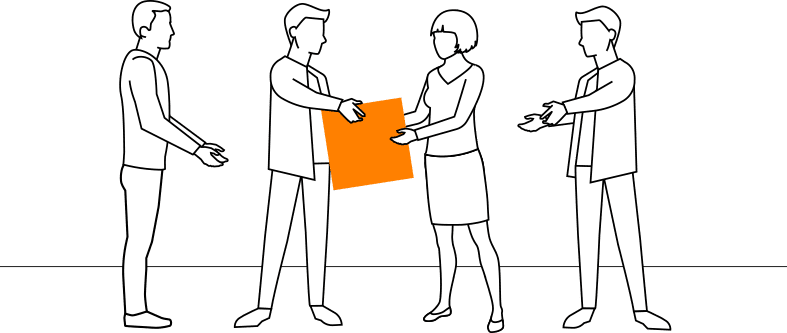
i. Partnerships
How do just two twenty-year-old blokes run an international business that brought in over a million pounds of revenue in its first year, all from a small warehouse?
Apart from a strong work ethic, a whole heap of bravery (and maybe a sprinkling of luck), it’s largely due to the network of partners and suppliers that the business is built upon.
Down in the middle of Wiltshire, we met the (annoyingly) young and successful Monty and Dan who run Furniture Box, a furniture company that imports and sells flat pack furniture online.
Monty, who set up the firm, started his business ventures at just 12 by selling sushi kits on eBay. By 18, he had found his niche in selling furniture predominantly on eBay, Amazon and Tesco Direct (and interestingly only 5% through his own website).
On the face of it, the business model for Furniture Box is very simple. Monty and Dan choose a series of products (all flat-packed) from a supplier in China, get the furniture shipped over, sell the product ranges on various websites (eBay etc.) and then ship to customers whenever they are ordered.
But behind the scenes, things are a little more complicated. The business relies on a network of ten different suppliers in China, as well as three delivery partners, accountants, currency brokers, insurance brokers and vendors – and their key channel partners who they sell through.
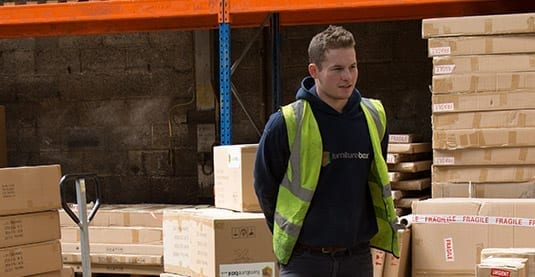
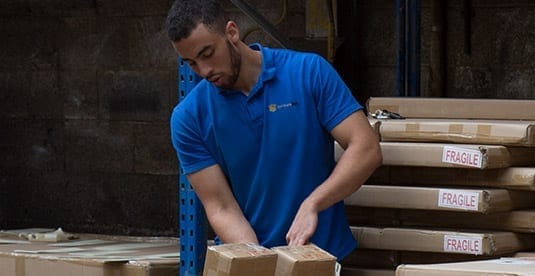
This network of partners essentially is the business and it depends on partners and suppliers who are helpful, reliable and, ultimately, an extension of their own business and the Furniture Box brand. You could really see what this meant for Monty and Dan when they were looking for brands to partner with.
We saw the same trend across a number of other businesses we met. Di Hassall, who runs shoe brand ‘Di’ based in Stratford-upon-Avon, spent a whole year finding the right partners and suppliers for her business. It’s a drawn out process, but it sets good foundations for the business.
Brands that want to be part of these partnership networks need to understand they are not just selling a product or a service; they really are fitting in as an important cog in the works for the people they sell to. Yes, cog not spanner; so don’t go over promising. That demands brands to do their utmost to look after their small business customers and build long lasting relationships and stop focusing on pure acquisition.
ii. Fellow small businesses
Whenever I was invited to an event, an old friend used to say to me: Networking is only one letter away from not working
This is certainly a view that Netty Reddish, the owner of a small business in the Peak District and creator of bespoke wooden items for consumers and businesses, strongly holds.
I used to think networking was for people with nothing to do – but now it’s an essential part of business.
Netty, along with her wife and business partner Marlene, have grown their business, Shop Reddish, via the small business network they work closely with.
In 2008, Netty opened Shop Reddish as a wood- and metal-working shop with a social purpose at its heart. She would use it to educate people, bring them together to learn new skills and, on the odd occasion, sell (or give away because she is so nice) personalised items for gifts.
As long as I could pay the rent and afford a few pints, I was happy, Netty very honestly told me.
But then Netty’s wife, Marlene, joined the business and things took a new direction. As an MBA student from New York, Marlene saw huge potential in what the business could do – and has put measures in place to run a tighter ship. Their success has been very much the result of the two working in partnership.
They both have a palpable passion for the importance of the ‘small business network’ and believe that not enough is being done to facilitate these networks. Marlene felt so strongly about this that she set up her own local networking group for small businesses. This group of likeminded professionals meets in the top floor of a pub to talk about specific challenges they’re wrestling with – and share their know-how on everything from product packaging to accounting software. The aim is for everyone who participates to benefit – and to help them become better businesses.
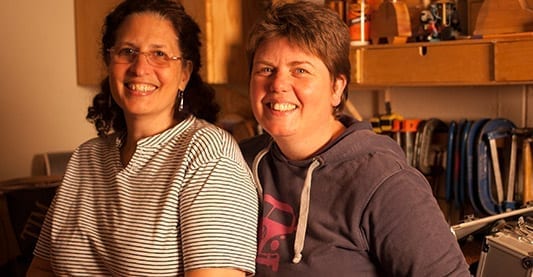
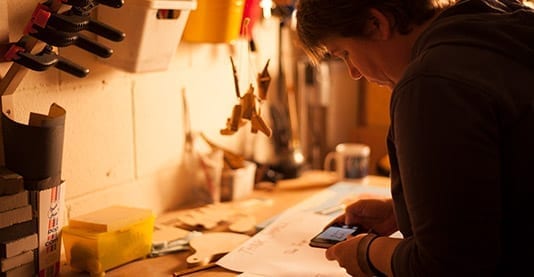
Marlene summarised it beautifully as she professed the key ingredient to small business success is doing it together, alone
.
As Shop Reddish continues to grow, interestingly the duo plans to focus more on B2B sales. It means the network of businesses that they are connected to will become even more important – both to increase the number of people they can learn from, but also sell to.
During The Trip, the thing we learned from all the small businesses we met is that they are crying out for a better way to network. And that’s miles away from the stuffy old clubs that try to service them at the moment. Brands that can help bring small businesses together and facilitate these networks will be seen as addressing a critical need and thus in a very favourable light.
iii. The local community
Support networks don’t just come in the form of other businesses – they also take the form of friends, family and members of the local community.
It’s these networks that Rob, owner of Lynwood & Co, has relied on to help support and grow his coffee shop and food business.
Rob came over to the UK from Australia. After working in hospitality for a number of years, he wanted to set up a business that brought some of the Australian culture to the UK – namely good coffee and the social culture that surrounds the coffee shops.
Lynwood opened its first shop in the small town of Lechlade in Gloucestershire, and when we went to meet Rob there the sense of the community around the business was clear to see.
The best bit about growing Lynwood has been the support from the local community. They have been so supportive, from spreading the word of the shop, to helping me out wherever they can to just their regular custom. And in turn I have tried to give something back. We buy our meat from the local butcher who comes in to buy his coffee and all of the bread we sell in the shop is from a friend down the road.
In return, Lynwood acts as a social hub for the local community and for local businesses to meet and network – as a result making themselves the epicentre of local businesses.
The importance of local communities and connections rang true across the majority of small businesses that we met.Harry Fry, our friendly cider farmer, exclaimed that when it came to looking for what to buy and who to buy from, it was All about local. We love to support local businesses.
Local communities and networks may prove the hardest thing for bigger businesses to break into, but if you can find a way chances are potential small business customers will lend you their ear.
Word up: If you want to avoid being seen as an out-of-touch corporate behemoth, kick that brand advertising into touch and get out there doing your bit on the ground. Be a brand providing a platform for small businesses to share and benefit from each other’s expertise.
iv. Support
Not everyone goes straight into running a small business. In fact, very few do. Most of the people we met along The Trip had gained experience in a larger company before scratching The Itch and setting up their own thing.
Some have done both. Di Hassall, owner of Di, set up her own small business before going to work in a larger organisation and later leaving to once again set up the business that she runs today (at the end of her garden).
Things have changed a lot,
Di told us.
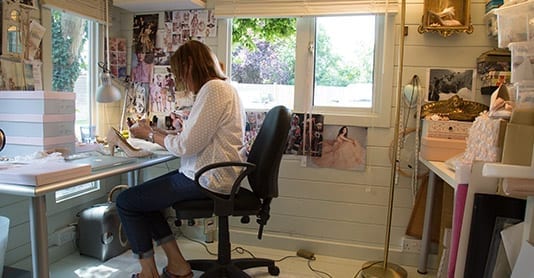
There are so many new technologies, channels and ways to sell that you have to get your head around now – you have to be jack of all trades and master of all.
We saw this in action as we followed Di around while she worked one morning. Not only does she have to dedicate time to her extremely skilled craft, she also has to spend much of her day learning new skills and updating and publicising her business on social media.
I am now having to learn and keep on top of all the new parts of running a business which is very hard. It’s massively important for small business owners and it takes up a lot of time.
Di is fully aware that this need to be the master of all trades doesn’t come easily, and is a real issue for all small business owners. And it’s not just about learning new skills like promoting yourself on social media – many small business owners need to face up to the fact that there are some parts of running a small business that are quite simply out of their comfort zone.
For Di this means relying on a support network of other businesses, friends, family and experts in many fields to help her learn new skills.
There is just not enough time to do everything. Everything you do you could do with devoting more time to that particular aspect. When I spend so much time on the promotional and marketing side, I worry I am not spending enough time on the creative side which means you can lose track of something. At the end of the day, I just need all the support I can get.
There are lot of things I am not an expert in, but you have to be an expert in. I am not fantastic at selling, which is not great in a small business, but would love to work with someone who can sell for me, or help build the website.
This is where content marketing really can come into its own. Small business owners are well aware of their weaknesses and knowledge gaps – and they’re crying out for help in a number of areas. Just be sure to make it accessible, interesting and do not waste their time – it’s precious.
The three big takeaways for marketers…
Connecting.
Help facilitate small businesses in connecting and learning from each other. They really are calling out for brands who can help them connect.
Instil your brand.
Tap into local communities and instil your brand wherever you can – many people are willing to be brand advocates if you offer them something
Customer service.
Put more time, money and effort into on-boarding and on-going customer service – they need your support as they continue to grow.
3. Struggles
No one ever said running a small business was easy. In fact, 1,500 miles and 18 business interviews later we were left wondering not so much ‘why do they do it?’ but more ‘how do they do it?’
Every small business owner we met spoke with such passion about the highs of running their own venture – from the joy you get when you see someone buying your product ‘in real life’, through to the buzz you get when you see that you’ve just had your busiest or most profitable month.
But at the same time every single person we met said this, or a version of these words: It’s hard, it’s really bloody hard.
To get a real insight into the life of small business owners and to find out what really makes them tick, we wanted to delve into some of the harder times that they have had – from the big obstacles they have had to overcome to the things that are currently keeping them awake at night.
This section explores some of the struggles that business owners face, the times they wish businesses had given them support in the hard times and the biggest issues that the best brands will need to address in the future.
At the end of the day nobody made me do it, I chose to do it – it’s just it’s very, very difficult.

i. The dark side of failure
I was once having a conversation with a friend about someone who had just launched his own business. He told me that while this person had enjoyed a high flying start to his small business adventure, things had recently turned rather rocky.
Over a pint, his mate had opened up to him about the most difficult bits of running a business that, at the time, was going south. Of course there was the dread of failure, the anxiety of letting friends and family down and threat of losing everything you have put into the business, but there was one quote that really stuck out: If I have to read one more article about how ‘good’ it is to fail, I’m going to scream. Because, quite frankly, it’s not good, it’s shit.
“
That quote has always stood out for me because I have always worried about how business culture has fetishized failure. While I fully understand the importance of stepping outside your comfort zone and sometimes falling flat on your face, I believe our obsession with failure has a dark side.
When we met Martin who runs Your Bike Shed, a cycling and bike repair coffee shop in the middle of York, he shared my worry about our obsession with failure.
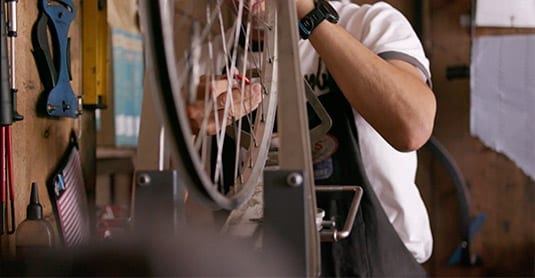
Not once has anyone come to see how hard I actually work, and what running a small business actually means
When we met Martin who runs Your Bike Shed, a cycling and bike repair coffee shop in the middle of York, he shared my worry about our obsession with failure.
The idea for the business came from a concept he had seen while travelling in Bangkok. When he brought it over here, he was the first of a kind in York and one of only a handful in the UK. While Your Bike Shed was a new and innovative idea, it was the constant narrative of failure, and particularly that of the failure rate of small business, that were his biggest obstacles to getting up and running and growing his business. The banks were reticent to loan money, not just because he was a small business, but also because he had an unproven business model in the UK. Thanks to the noise around small business failure, his business was written-off by many before he even got going. Funding was hard to come by and support was hard to find.
Thankfully, despite these obstacles, four years later his business is thriving, and it was lovely to see someone with so much passion for what they do clearly doing so well.
But Martin still thinks that big businesses and brands are not pulling their weight when it comes to looking after their small business customers. Not once has anyone come to see how hard I actually work and what running a small business actually means,
Martin told us.
When we asked him if he thought marketers’ obsession with digital channels is making this worse, he agreed completely. I think digital channels are ruining communications between people in general as no one wants to interact person to person anymore.
It was a stark insight into the world of a small business owner – businesses will treat you like a king when they need your custom, but be happy to sit behind a computer screen the rest of the time. And if you want to dare to innovate, it’s the risk of the big F word that will stand in your way because, whilst it may be glamorous to talk about, it’s just far too risky for businesses to bet against.
If we want real innovation and new small businesses that break the mold and disrupt industries in the UK, we need to celebrate more successes rather than talk about and glamorize failures – it will give everyone more confidence (most importantly the banks) and allow us to progress at a much more rapid rate.
ii. Judgement
When Ann-Marie and Paul decided to give up the day job, move to the Lake District and set up a Bed and Breakfast, after much searching they ended up buying a business that was failing and came with a bad reputation.
This left them with only one option – they had to start from scratch and aim to build a four-star business in as short a time as possible. The only way they could achieve this was to focus first and foremost on quality – but at the same time, they were constantly at the mercy of review sites.
There are many small businesses that live and die by our ‘review culture’ but none more so than those who work in the tourism industry.
Getting an insight into the impact of review sites like TripAdvisor during The Trip was fascinating. Some businesses I met said that review sites can be damaging to a business (as well as to their ego).
“I feel like we live in a world where it’s on trend to complain about anything you possibly can, while hiding behind a keyboard. This can make it much easier to forget that the people you are criticising are humans too, and the effects of the grumblings can be much wider reaching than you think.
“
83%
of people say reviews on
TripAdvisor help them
choose the right hotel
80%
of people read 6 – 12
reviews before booking
a tourist activity
Others, however, think review sites are essential partners for small businesses to thrive and grow in today’s digitally focused world – especially in crowded sectors like tourism, where there is often little to differentiate between competition on the face of things.
In a world where consumers are changing the way they research and buy online, it’s clear that review sites are going to have a bigger impact on small businesses than ever. The stats speak for themselves: 83% of people say reviews on TripAdvisor help them choose the right hotel and 80% of people read 6-12 reviews before booking a tourist activity (source).
And it really is Tripadvisor that yields the power. “We used to get inspected by Visit England, but TripAdvisor has taken over from that. Why would I pay Visit England £400 to review us when all your inspectors are online and we are clear about the standard we need to adhere to.
“
But life under the spotlight isn’t all bad. In fact it’s helped Ann-Marie and her husband achieve their goals.
“It’s driven up the standard, and rightly so. Why should we get away with not sticking to the standards we have set out?
“
It’s also worth considering what brands can do to help. What can you do to help small business owners improve the service and experience they deliver to their customers?
iii. The light side of failure
Here’s a situation not too many people want to find themselves in.
You’ve spent years building your own business. You’ve taken out a long lease on a large, four-story building in a major city centre. You’re running the sort of business you’ve always wanted to, and it’s growing. Then one day a large investor pulls out, leaving you in a financial hole and you’re 48 hours away from administration. You call in your staff and open up to them: If you’re willing to work for a week for free, then I think, I think, I can save the business.
That’s exactly the spot Iain Simons, owner and founder of National Videogame Arcade in Nottingham, found himself in two years ago.
We met Iain in his office surrounded by video gaming memorabilia heaven– for nerds like us – where he told us his story.

It doesn’t matter does it? It’s just part of it. Everyone has fucked something up. If this fails, you can always do something else
The biggest thing you think about when you start your own business is what’s the worst than can happen. And then the absolute worst does happen and it’s a strange feeling. It’s sort of like you’re watching a film with yourself in it and thinking ‘I wonder what he’s going to do now?’
Iain thinks the real reason businesses don’t want to stare failure in the face is through fear of looking stupid, something he said he got over the minute he stepped on stage in his younger years as a musician.
It doesn’t matter, does it? It’s just part of it. Everyone has fucked something up. If this fails, you can always do something else. To be honest, I wish I’d taken more risks than I did – just accepting that you might fuck it up and look stupid already puts you ahead of 90% of the populous.
I just want to have an interesting day – that’s it. It’s not all-smooth sailing but, at the end of the day, that’s all part of it. The highs and the lows.
Iain’s parting note was about bigger businesses – and the real difference between them and him. Often nobody in bigger businesses want to make a decision, because they want to be to blame if it goes wrong. They don’t want the responsibility. That’s the difference in something like this. It’s my fault. You’ve got to be willing for it to be your fault.
Maybe marketers and business need to understand better the highs and lows of failure and bravery and what they mean to their potential customers. Failure is very real and very scary.
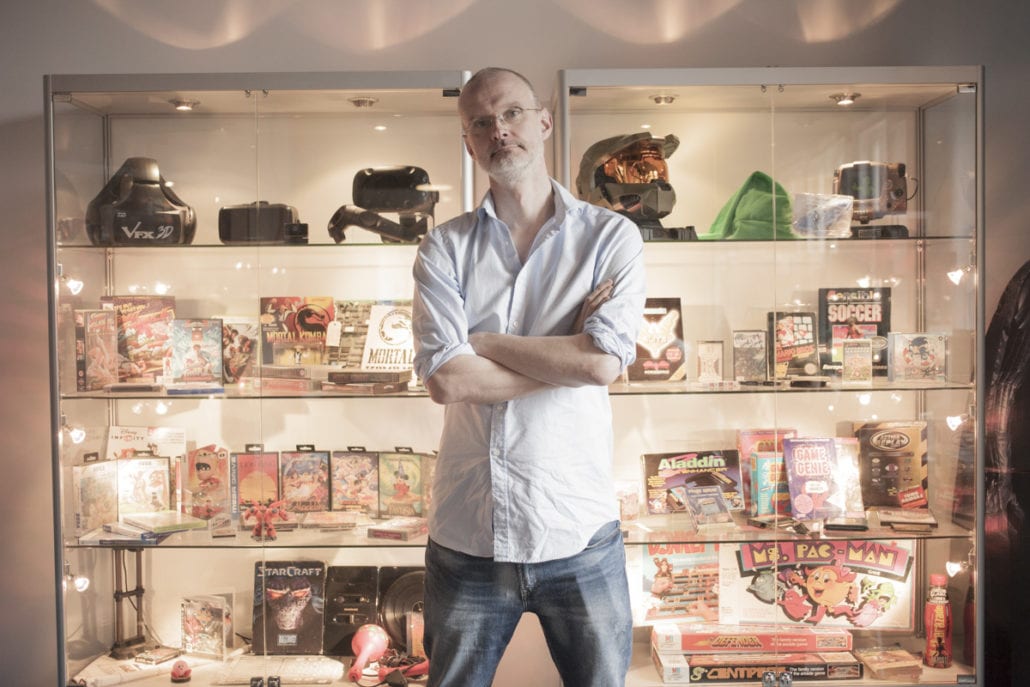
The three big takeaways for marketers
01
Treat your customers as humans, not just another lead of acquisition. Understand that they have emotions and rely on you (as much as you do on them).
02
Help them minimise risk throughout your relationship – don’t sell and leave but show them you are with them all the way.
03
Get face-to-face time as often as possible. While social is growing, it’s ‘each behind a screen’. Get in front of your customers and invest in relationships.
4. Dreams
What’s it all about, hey? Why do people do it? Why put yourself through the gruelling hours, the highs and lows, the endless hard work, the inability to switch off and draw a distinction between your personal life and business?
What is it that makes people take the brave leap from the guaranteed pay cheque of a 9-5 job in a large business to go it alone and risk it all?
At the end of each interview, we asked every person we met what it takes to be a small business owner – what they think the key characteristics are of someone who wants to succeed in the world of small business.
Many had their unique answers: You need to be resilient
, You need to be versatile
, and It’s about having trust in others.
.
But without fail, every single small business owner said: Passion. You need to have passion. If you’re not passionate about something, if you don’t really care, if you don’t have a personal dream that you’re trying to achieve, then you simply don’t stand a chance.

i. Diversification
When it came to looking towards the future, it was clear all the small business owners we met had big ambitions with their sights set firmly on what their business could become.
A big part of this for many was the need for diversification. This was certainly something that was on the mind of Chris Wildman who runs Town End Farm in the Yorkshire Dales.
Town End is currently a farm shop, a tearoom and producer of beef, lamb, pork and charcuterie for chefs and hotels across the Lake District.
Chris knows from experience the importance of keeping up with current trends and moving with the times.
I was born a butcher’s son, so I was born a butcher. It’s what I’ve always known. It’s born into you, so I don’t see it as being anything out of the norm.
We used to have a long-running family business until changing shopping attitudes basically crushed that business and it became defunct.
We had two butchers, a deli, a frozen food shop. It was fantastic and would have survived, if only it had been in Dulwich in London.
Chris now is keen to pass this business and the farm down through the generations, but knows it needs to keep evolving and growing.
The only way to continue is to have it passed down from generation to generation. We don’t want to move, and the kids don’t want to move.
And diversification is so important, especially with any farm – you need to be constantly on the look out for new ideas and innovation. My head is buzzing with new ideas and extensions to what we are doing. We’ve built the butchery on the farm and are now running butchery courses. Now I’m thinking about camping pods, glamping, anything new! There are just not enough hours in the day.
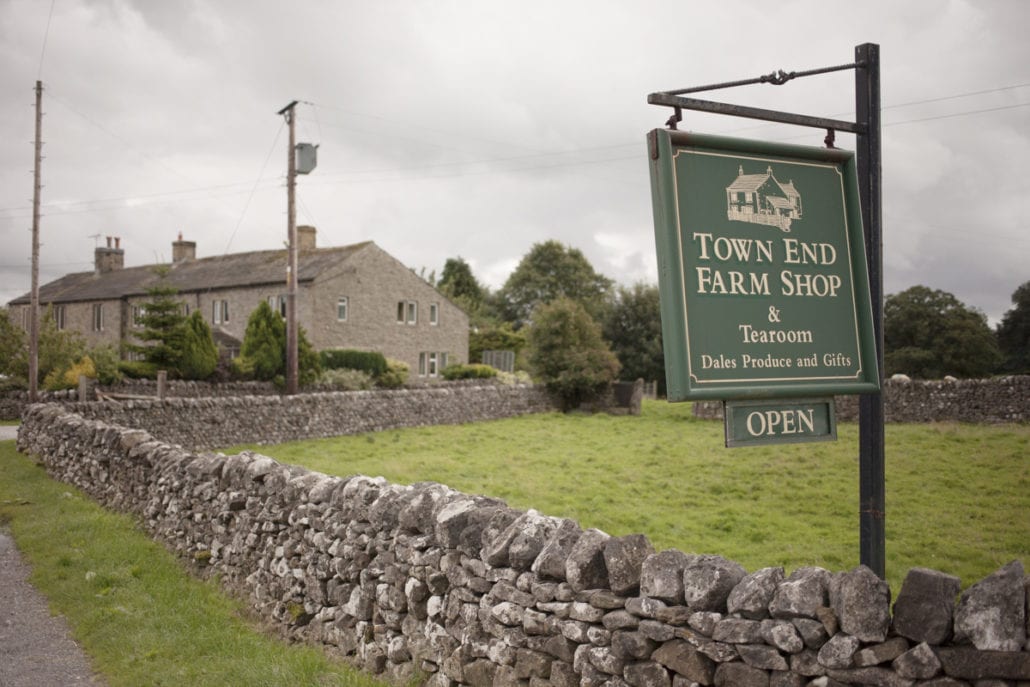
We can’t afford £7000 on a new website. Some of these businesses have to understand small businesses aren’t going to spend £10,000 on marketing or whatever
It’s clear that small businesses want to keep diversifying, but they need help from big business to do this. Take, for example, the basics of connectivity:
We fought for ages to get fibre broadband here and that has changed the business and helped us set up ecommerce stores. But when it comes to phones we don’t have 4G, we don’t even really have 3G. Mobile networks aren’t interested in rural areas. They just don’t seem to want to bother with it.
The same goes for bigger businesses offering products and support that is simply worlds away from their price range. One thing you really do realise when coming out of London is that many larger businesses have their price points completely wrong when it comes to selling to small businesses. Something that really frustrates Chris:
We’re a small business. We can’t afford £7000 on a new website. Some of these businesses have to understand small businesses aren’t going to spend £10,000 on marketing or whatever. It’s just a different world.
Bigger businesses have time and money and energy to get the grants, but I just don’t have the time. The whole grants system needs looking at – until then it’s just the money that comes from customers to help us move ahead.
It’s a clear sign that marketers need to better understand the small businesses they are talking to – not only their hopes and dreams but also what it really means running a business in difficult conditions. If ever we saw a business that was disadvantaged by the London bubble, it was Town End.
Mobile networks aren’t interested in rural areas. They just don’t seem to want to bother with it
ii. Having an impact
The final scene of The Office Christmas Special finished with this quote from David Brent:
A philosopher once wrote: You need three things to have a good life. One, a meaningful relationship. Two, a decent job at work. Three, to make a difference. And it was that third one that stressed me. To make a difference. And I realised that we all do. Every day. It’s how we interact with our fellow man.
It wasn’t an accident that these were the last words from the man who ran arguably one of the most famous and most loved fictional small(ish) businesses to grace our screens.
Despite every business having their different foundations, during The Trip we really saw the desire to make an impact, in whatever form that might be, was a central thread of every small business in this country.
You could be a business like Robin Hood Energy in Nottingham, which is a one of a kind energy company set up with a social mission at it’s heart: to solve the issue of fuel poverty by making sure everyone has access to affordable gas and electricity. Or you could be Matt over at Temple Cycles who wants to change the way we all get around. Or you could just want to leave behind your own little mark on the world like Paul Rose, who runs the Owl Sanctuary up in Barrow in Furness.
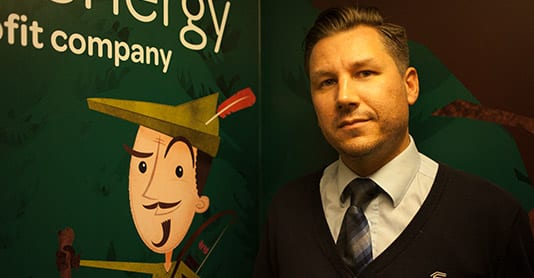
We need to stop destroying this world like we have been. I need to set this up before I leave this earth, so I can leave something for the planet
I was flying for the Air Force and had received an MBE for services to defence, then I lost a toe on my left foot and then lost my leg due to diabetes.
But I couldn’t just sit around and wallow, I wanted to go and do something with the rest of my life.
After volunteering to look after owls as a way to rehabilitate himself, Paul decided to set up a small charity to educate youths and the wider community about why this animal is so important.
It’s not been easy, and he’s still in the middle of the process with lots of hurdles in the way.
I started trying to turn it into a charity four years ago in 2013 – but it’s all the bloody paper work that’s been difficult. I’ve always been a person with hands, not brain. The paper work is phenomenal – and time out with the owls was being taken over doing the paper work. There is no funding or support from the government, so I’m on my own.
So why does he do it?
We need to stop destroying this world like we have been. I need to set this up before I leave this earth, so I can leave something for the planet.
It seems business dreams can come in all shapes and sizes. If, as B2B marketers, we realise this, our role completely changes. We are no longer just a ‘fluffy’ marketing department or a support role to sales – we are the people who can support, build and develop the dreams of thousands of small businesses across the country.
And that’s pretty exciting.
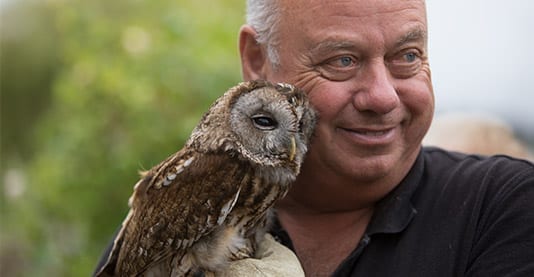
So what do marketers need to do?
1.
Encourage bravery and help them make their dreams come true. Show them that you are the key to achieving their goals.
2.
Lead with ambition and show that you are the brand and business who can inspire and educate them to grow and get better
3.
Celebrate their success and show them you care – a little bit of surprise and delight can go a long way
Final thoughts
As marketers, when it comes to speaking to small businesses we have a big job on our hands.
After sitting down with many different small businesses, from all walks of life across the country, one thing struck me: the humanity of it all. There really is too much of a blurred line for all of the owners to distinguish between the people and the business.
But for the last decade we have been busy de-humanising all things marketing. First came the rise of email, enabling us to drop generic messages into people’s inboxes. Then the rise of social media led us to think we were getting closer to prospects and customers – but we were actually hiding behind a computer screen. Next, marketing automation enabled us to fire out ‘right place, right time’ marketing messages but which all really lacked the human touch. And now, looking into the future, we have chatbots and AI lurking around the corner which will take away yet another layer of human interaction.
It’s time we started to shift and readdress the balance:
It’s time to really understand the ‘why?’ that lies at the heart of all your small business customers.
It’s time to tap into small business networks and really understand all the cogs that make the machine works.
It’s time we started putting time, resource and money into supporting small businesses right from the get go, not just treating them as a number on the sales sheet.
It’s time we stepped up to help what is ultimately the backbone of our economy.
Are you up to the challenge? It’s not going to be easy, but you’ll know you’ve succeeded when you get The Nod.

